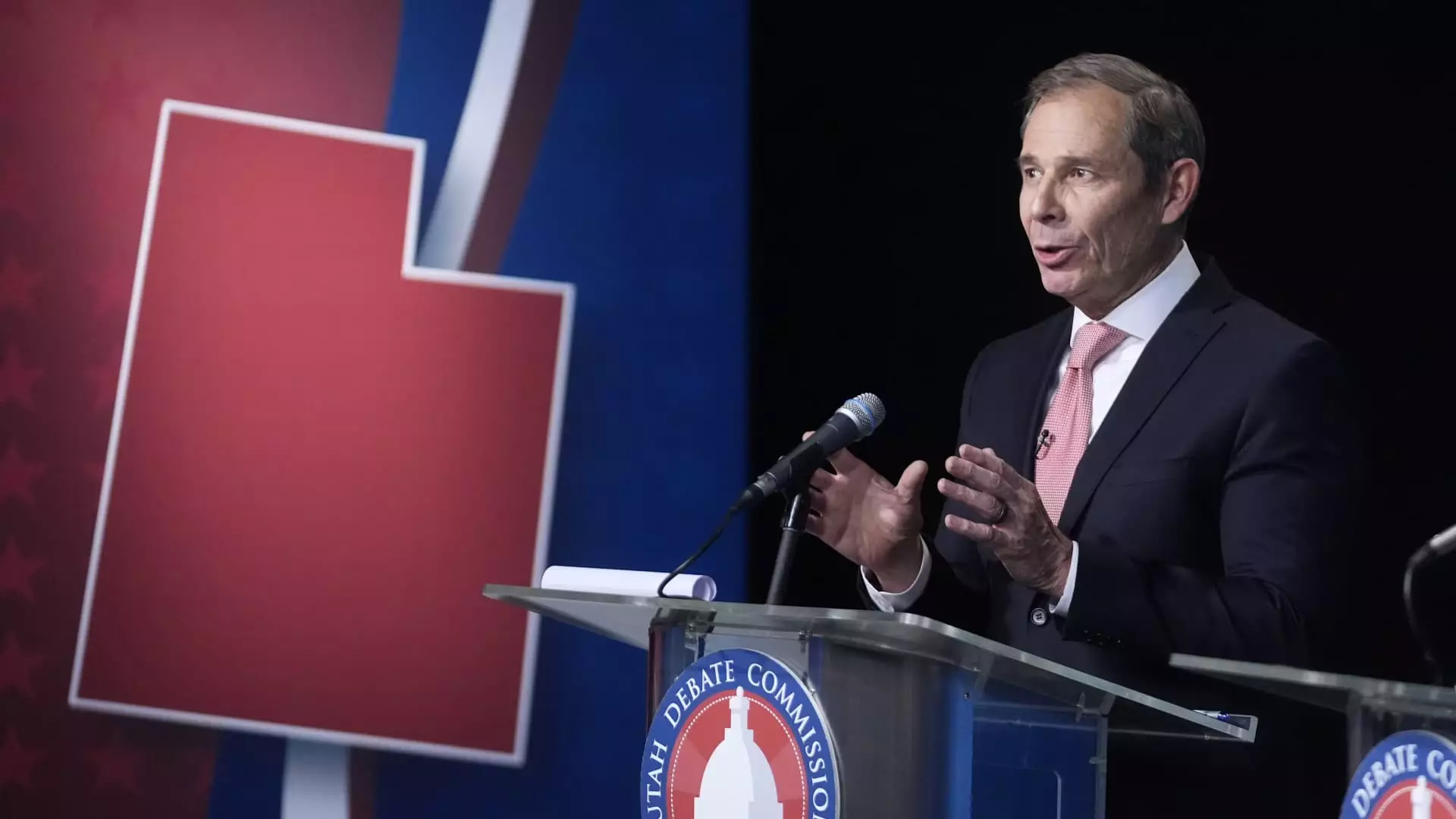In a striking example of the intertwining worlds of politics and technology, John Curtis, a Republican congressman from Utah, is garnering unprecedented support from the cryptocurrency sector as he campaigns for a Senate seat previously held by Mitt Romney. Curtis’ journey to becoming a crypto favorite paints a vivid picture of how unconventional pathways through industries like telecommunications can lead to influential positions in governance. Recently at a Permissionless conference in Salt Lake City, he shared a story about an enlightening yet perplexing dialogue with fellow lawmakers regarding internet service speeds. When Curtis posed the question of whether any of them had actually performed a speed test themselves, he was met with baffled expressions, signaling a disconnection between lawmakers and the technological realities facing their constituents.
This peculiar encounter was not a mere anecdote; it sparked a realization within Curtis about the necessity for lawmakers to engage more earnestly with the technologies they regulate. His embrace of this principle extends beyond his experiences with internet service providers to the dynamic domain of cryptocurrency. Curtis ardently believes that without a proper understanding of the technologies involved, government officials risk enacting misguided regulations. His conviction resonates strongly within the crypto community, which recognizes the potential dangers of ill-informed policy-making. As Curtis put it, “The worst part of regulation is its unpredictability,” a sentiment that echoes throughout discussions on digital asset governance.
Curtis’ proactive stance on crypto policy has undoubtedly attracted significant financial backing. His campaign has seen a substantial influx of donations, largely coming from crypto enthusiasts who align with his vision for a supportive regulatory environment. The Defend American Jobs PAC, which focuses explicitly on cryptocurrency and blockchain advocacy, has funneled over $1.9 million into Curtis’ Senate campaign. This level of financial support underscores the crypto industry’s growing political power, underscoring its assertive role in shaping electoral outcomes.
In an environment where political contributions by digital asset proponents are on the rise, it’s worth noting that the crypto sector has eclipsed traditional industries, such as banking and oil, in terms of campaign donations this election cycle. With reports indicating that crypto-linked PACs have collectively allocated over $130 million in congressional races, there’s a paradigm shift underway in how digital assets intersect with political finance. This movement showcases not only the strength of the crypto base but also its determination to support candidates who advocate for favorable regulation, setting the stage for a potentially transformative period in U.S. politics.
Curtis is not isolated in his journey; his candidacy reflects a larger trend where candidates across the political spectrum are courting the crypto community. Notably, data reveals that more than 40 million Americans own cryptocurrency, creating a sizable and young voter block that leans towards candidates supportive of digital assets. As illustrated in recent reports, over half of this group is primed to support pro-crypto candidates, presenting a tantalizing opportunity for political figures willing to engage with this demographic.
Furthermore, various PACs, most notably those supported by major crypto entities like Coinbase and Ripple, are strategically investing in races that could influence Senate and House outcomes across the nation. Through hefty contributions, these PACs aim to bolster candidates perceived as allies of the industry while simultaneously targeting those deemed adversaries. The Republican party, for example, has received upwards of $10 million each to support strong crypto candidates in crucial races in Arizona and Michigan.
This influx of funding and interest reflects a transformative phase for crypto-partisan politics that extends beyond the mere endorsement of candidates. It underscores the industry’s push for self-governance, as leaders like Curtis advocate for developing reasonable frameworks that do not stifle innovation while ensuring safety. Ideally, this presents an opportunity to cultivate a bipartisan alliance that focuses on effectiveness over partisan division.
The implications are significant. As legislative bodies become increasingly aware of the needs and desires of a new generation of voters who value crypto-friendly policies, the potential for a future where digital assets are fully integrated into the financial landscape becomes more tangible. Political figures across the aisle are beginning to recognize that when it comes to crypto, their focus serves a dual purpose: safeguarding their political future and paving the way for a new economic paradigm.
In sum, John Curtis embodies a new breed of politician—a figure who navigates the complexities of emerging technologies while attempting to reshape regulatory landscapes. As the crypto sector becomes more entrenched in political strategy, the journey is just beginning, fueling broader debates that could alter the trajectory of American economic policy for years to come.

